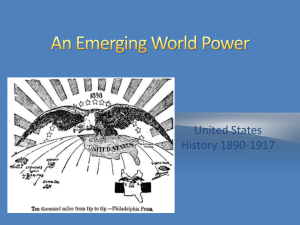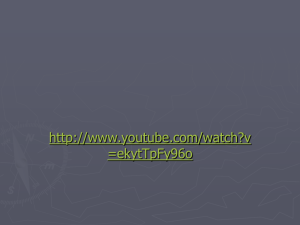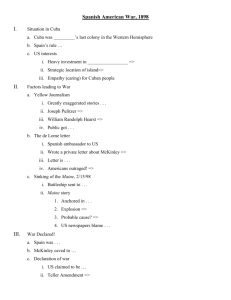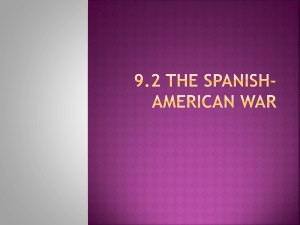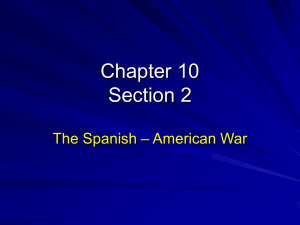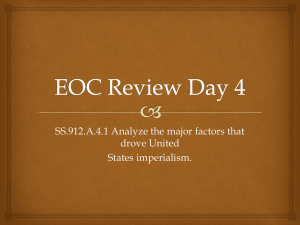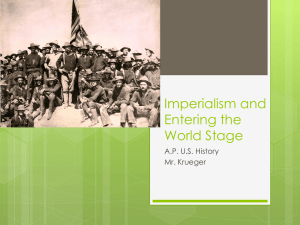Spanish-American War
advertisement
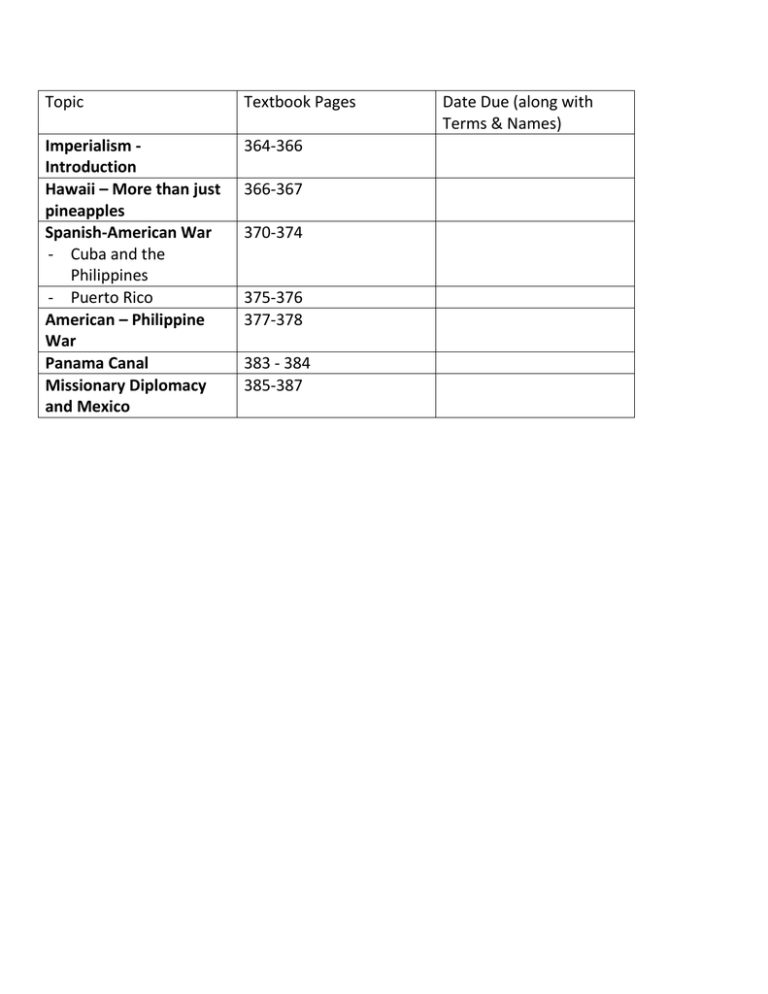
Topic Textbook Pages Imperialism Introduction Hawaii – More than just pineapples Spanish-American War - Cuba and the Philippines - Puerto Rico American – Philippine War Panama Canal Missionary Diplomacy and Mexico 364-366 366-367 370-374 375-376 377-378 383 - 384 385-387 Date Due (along with Terms & Names) Unit: Imperialism- Introduction Chapter 10 - Section 1,2 Notes Textbook 364-366 Define/Identify according to the reading the following terms in preparation for class Imperialism: Who was Admiral Alfred T. Mahan: HOMEWORK STOP Why did Americans warm to the idea of Imperialism? 1) ___________________________________ among industrial nations 2) ___________________ and _______________________ competition 3) Belief in the racial and cultural superiority of _________________ (English) descent as compared to _____________________________ Who was Admiral Alfred T. Mahan and what was his argument? *For a strong __________________ to _________________ the peacetime ___________________ essential to ___________________________ *Also needed _________________________________________________ where fleets could refuel What was his 3 Part “Suggestion”? a) ___________________________________________________________ b)____________________________________________________________ c)____________________________________________________________ #3 (above) Ideological Motives - A desire to “civilize” non-Europeans also spurred the development of imperialism - Belief US had a responsibility to spread ________________________________________________________________ But not every American was “onboard” with Imperialism 1) ______________________________________ 3) ______________________________________ ______________________________________ ______________________________________ 2) ______________________________________ 4) __________________________________________ ______________________________________ __________________________________________ The White Man’s Burden and The Brown Man’s Burden – Reading and Questions Class Discussion Notes: Hawaii Textbook 366-367 Define/Identify according to the reading the following people and their connection with Hawaii in preparation for class Sanford B. Dole: Grover Cleveland: William McKinley: HOMEWORK STOP Since 1790s, American merchants had stopped in Hawaii on way to China and East India Why? 1.________________________________________________________________ 2.________________________________________________________________ In mid 19th century – American-owned sugar plantations accounted for about ________ of the islands wealth Who benefited from close ties with US – ________________________! 1) Sale of Hawaiian sugar without a duty (def:_______________________) 2) White business leaders forced King Kalakaua to change Hawaii’s constitution to grant voting rights only to ____________________________…so who did this basically give control of Hawaii’s government to? _________________________________ 3) US strong-armed Hawaii into allowing a naval base to be built at__________________________ When King Kalakaua died in 1891, his sister Liliuokalani became queen • She proposed ____________________________________ *This would have restored political power to _________________________________________ HOWEVER business groups and U.S. ambassador organized a ______________________ against the queen Night of January 16th 1893, the U.S.S. Boston appeared in Honolulu harbor American marines moved ashore (supposed mission ________________________________________________________________________________________ At same time, volunteer troops took over government building and imprisoned the queen in her palace And who became the president of this provisional (def:___________________________________________ ) government ? ___________________________________ The US ambassador immediately _________________________________the provisional government - sent commission to Washington D.C. o Asked that the islands be annexed def: _____________________________________________________ o BUT after a special investigation, Stevens (Who was he? ________________________________) was blamed for revolution o President ________________________ restored Queen to her throne NOT THAT SIMPLE… Dole ____________________________________________ So Cleveland (unwilling to use force) formally recognized the Republic of Hawaii BUT he refused to consider annexation unless _______________________________________________________ • THEN ___________________________________ succeeded Cleveland as president (_____________________ annexation) • Congress then proclaimed Hawaii an American territory without Hawaiians _______________________________________________________________ Chapter 10 - Section 3,4,5 Notes Interest in Cuba Textbook Pages 370-372 Define/Identify according to the reading the following terms/people for class Jose` Marti`: Valeriano Weyler: William Randolph Hearst: Joseph Pulitzer: Yellow Journalism: Enrique Dupuy de Lome: STOP HOMEWORK During this period - Spain had control over Philippines, Guam, few outposts in Africa, Cuba and Puerto Rico What does that have to do with America? _________________________________ began investing $$$’s in large ______________________________ plantations - Cuba’s economy depended on sugar & US becomes main market However Native Cuban Anti-Spanish sentiment soon flared and erupted in war ________________________________ (Who was he?) - launched a revolution (_____________________________ destroyed property) ESPECIALLY American-owned sugar mills and plantations *Called for ___________________________________________________________! Why attack American-owned sugar mills and plantations? -He had counted on _______________________________________________________________ Spain responded by sending General ___________________________ to restore order -Believed regular military methods would not work against guerrilla tactics moved the entire rural population of central & western Cuba into _______________________ (died from hunger and disease) How does this affect Americans? Weyler’s actions fueled a war between ____________________________________________________ _____________________________ __________________________________ How do newspaper’s war? BY PRINTING ______________________________________ OF “BUTCHER” WEYLER’S BRUTALITY -Poisoned wells; children being thrown to sharks What did this do? deepened ______________________________________________________ Legitimate reports of Cuban suffering mixed with sensationalized stories became known as ______________________________________ Spain wasn’t going to just sit back and do nothing… restricted US reporters (no combat areas) *Some correspondents claimed they were ___________________________________with rebels *Others gathered in Havana's (capital) bars and _______________________ battle stories Hearst even sent an artist to Cuba to illustrate stories When Frederic Remington (artist) reported unlikely war between US and Spain, Hearst reportedly replied “____________________________________________________________________” Many Americans sympathized with Cuban rebels demanded _________________________________ President McKinley preferred to avoid war – tried diplomatic means with Spain to resolve the crisis 1) Spain recalled ________________________ 2) _________________________ concentration camp policies 3) Offered Cuba __________________________________ HOWEVER, in Feb 1898 - NEW YORK JOURNAL published a private letter written by Enrique Dupuy de Lome - How was it obtained? A Cuban rebel stole the letter from Havana post office - leaked it to newspaper -What did it say? Criticized President McKinley for being ___________________________________________ -Some Americans agreed with letter BUT resented criticism of their President A few days after publication of letter resentment towards Spain turned to OUTRAGE - Why? McKinley had sent ______________________ to Cuba to protect American lives and property (riots in Havana) On Feb 15 an explosion sent the ship’s ammo up in flames and it ___________________ Causalities – ______ American officers and crew died HOWEVER – Who did journalists hold responsible? ________________________ EXPLOSION OF THE U.S.S. MAINE – WHICH ACCOUNT MORE BELIEVABLE? Reading and Chart After Discussion: Think about It? Does this difference in accounts matter? Why or why not? “___________________________________” was the battle cry now War Breaks Out Textbook Pages 372 - 374 Define/Identify according to the reading the following terms for class George Dewey: Rough Riders: STOP HOMEWORK Public opinion wanted _________________ (even though Spain had agreed to some concessions) April – McKinley asked Congress for authority _________________________________ against Spain in order to ____________________________________ – agreed after debate SPANISH AMERICAN WAR #1 – ______________________________________ of Cuba #2 – American troops organized _______________________________ (small # ; largely inexperienced) #3 – Plans for the use of ____________over troops – Why? The Philippines and Dewey’s victory! • T. Roosevelt ordered Pacific fleet (George Dewey) to sail for Philippines in case war broke out – • Why there? ____________________________________________________ • US Navy launched surprise attack and destroyed Spanish fleet - U.S. soldiers fight with Filipino rebels against Spain • After defeating Spain however, the U.S. fails to grant the Philippines ___________________________________after the war (leaning towards annexation) • Filipinos, unhappy that they were under the control of yet another colonial ruler__________ (U.S.-Filipino fighting breaks out and continues for years) *see more later Back to the Battle for Cuba – Teddy Roosevelt and the Rough Riders Reading and Questions On Dec 10 1898, US and Spain agreed to Treaty of Paris (4 month War) – A ____________________________________________ 1) Cuba would become ______________________________ 2) Spain would give _______________________________________________ to US 3) US would pay Spain ______________________________ for annexation of the Philippine islands BUT this treaty touched off great debate in the US… 1) Misunderstanding among some – US ___________________________________________ Filipinos 2) Political – violated ___________________________________________________ by denying selfgovernment to newly acquired territories 3) _____________________ - need to solve race-relations at home first BEFORE taking on social problems elsewhere 4) Self-serving - __________________________________ would compete with Americans for jobs But it wasn’t over – Puerto Rico and Cuba 1) Some Puerto Ricans (which Spain gave to US in the treaty) wanted ___________________________ – US gave them no promises – Why? - American officers doubted that Puerto Ricans could ____________________________________________ [set up military government] -Many at first welcomed US intervention (improvement over Spain) - Some campaigned to end military government (Yankee-peril) and requested US citizenship and full local self-government – statehood OR complete independence - BUT US had different agenda 1) ____________________________________________ 2) ____________________________________________ *US denied citizenship to Puerto Ricans and President appointed their Governor and members of Upper House of Legislation (Puerto Ricans could only elect Lower House members) AND US Constitution did not automatically apply to people in acquired territories In Cuba, Jose’ Marti’ (Who was he?_______________________________) had feared this earlier ______ would just replace ______________ and dominate Cuban politics - Same officials (as under the Spanish-control) _____________________in office - Cubans who protested were ___________________________________ However – American military government provided food and clothing, helped farmers (land to cultivate), organized elementary schools , medical services (eliminated yellow fever) Cubans called to arms to defend their national honor – US stood firm and Cubans (reluctantly) ratified - Cuba becomes _______________________________________ def: a country whose affairs are partially controlled by a ______________________________ Why would US do this? _____________________________________________________________ - sugar, tobacco, mining, railroad, public utilities *Political control of colonies was necessary in order to protect ____________________________ American troops did withdrawal but returned ____ times to intervene in Cuban Affairs Established naval base at where? _________________________________________ But it wasn’t over – Philippines Native Filipinos were intent on independence - outraged about America’s annexation - Rebel leaders (Emilio Aguinaldo) believed US had ____________________________________ - He proclaimed Philippines an independence republic and drafted a constitution (however there were still a presence of America soldiers) Tried guerilla tactics US response … _______________________________________________ *Conditions _________________________________________________________________ ??WEREN’T THESE THE SAME PRACTICES THE US CONDEMNED SPAIN FOR IN CUBA?? White soldiers looked down on skin color of Filipinos - However, stationed there as well were ____________________ African-American soldiers African-American newspapers questioned? ______________________________________________________________________ ? *Some African- Americans soldiers ___________________________ to the Filipino side The Philippine-American war lasted_____ years - squashed but at high cost - $400 million (_____x’s what US paid for the islands) Soldiers in the Philippines: Asking Why? Reading and Chart WHAT WAS THE IMPACT OF THESE TERRITORIAL GAINS? Prior to Spanish-American War, many Americans didn’t even know where Philippines were located – Acquiring new lands forced Americans to expand their knowledge of distant lands There were still those who continue to oppose Imperialism Shall we go on conferring our Civilization upon the peoples that sit in darkness, or shall we give those poor things a rest?...Extending the Blessings of Civilization to- Mark our Brother who Sits in Darkness has Twain been a good trade and has paid well, on the whole; and there is money in it yet…but not enough, in my judgment, to make any considerable risk advisable. Mark Twain’s quote - How would summarize the arguments of those who opposed American imperialism? __________________________________________________________________________________________ __________________________________________________________________________________________ Section 5 America as a World Power Textbook Pages 382-387 __________________________was assassinated in 1901 – - ___________________________________ becomes President. He was Assist. Sec. of Navy and became VP in 1900 when McKinley’s former VP Garrett Hobart died By this time, US had achieved ______ out of 3 of the recommendations for becoming a world power (according to ___________________________________) Had a modern navy and naval bases in the Caribbean and Hawaii 3th GOAL – _______________________________________ through Central America What was the point of having a canal? **Greatly ________________________________________ for commercial and military ships Summary of how US got the land and built the Panama Canal • U.S. buys Spanish rights in 1903 to Panama from Colombia • U.S. backs Panamanian rebels independence against Colombia • Successful and US recognized Panama as independent country • Treaty with US – 10 mile strip of land to build canal (1904 – 1914) • US controlled (until 1999) Panama Canal Political Cartoon Examination and Questions So what can we conclude from the US pursuing and achieving several foreign policy goals in the early 20th century? 1) Expanded access to ______________________________________________ in order to ensure the continued growth of the domestic economy 2) US builds a modern ________________to protect interests abroad 3) US exercises its international power to ensure ______________________________________________ US HAS BEEN DRAWN DEEPER INTO WORLD AFFAIRS WITH PURSUIT OF IMPERIALISM BUT IS LEADING THEM TOWARDS A WAR THEY COULD NOT AVOID…_________________
